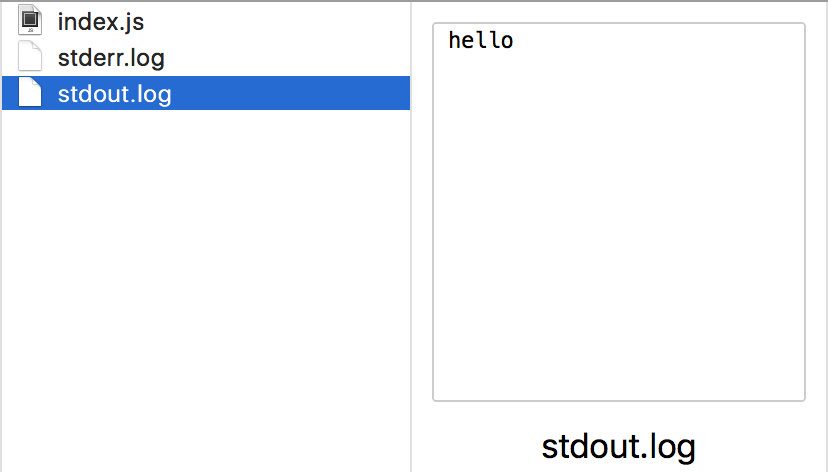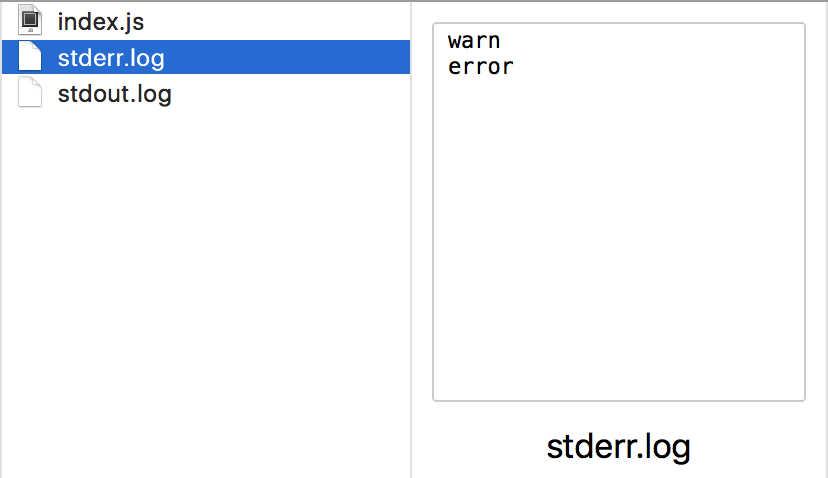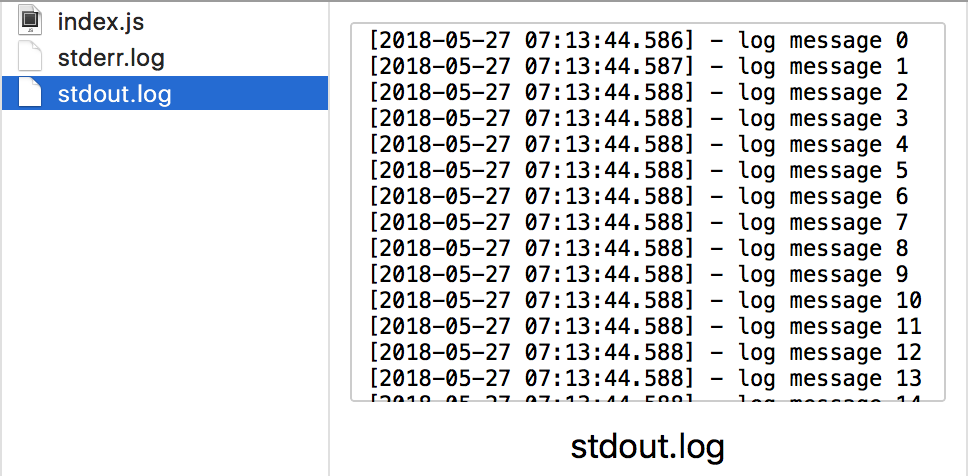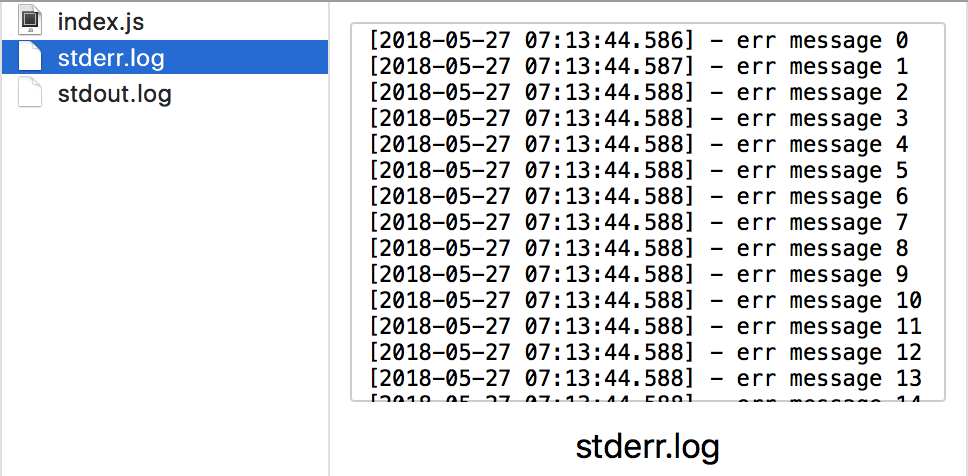Node: 通过Console打印日志 (Log Message via Console)
In normal development, we are likely to use 'console.log' for message logging, yet it’s simple, we are unfortunately not able to persist the messages in production mode. And you may look for some third party libraries to meet this demand, actually we can easily achieve it via 'Console' object, so why don’t implement one by ourselves?
Today I will show you a simple logger program with 'Console' object, and imitate a real logger library.
As we mentioned above, we often use 'console.log' for printing message on terminal, in fact, the 'console' is a module in Node.js, we can import explicitly with require('module'), but unnecessary, because it's also a build-in global variable, that's why we can use it directly.
Since the global console instance configured to write to 'process.stdout' and 'process.stderr', the two forms below will behave the same:
// to stdout
console.log('hello');
// to stderr
console.warn('warn');
console.error('error');
// they are equivalent to:
// create our own console
let myConsole = new console.Console(process.stdout, process.stderr);
// to stdout
myConsole.log('hello');
// to stderr
myConsole.warn('warn');
myConsole.error('error');
What if we change process.stdout and process.stderr to other streams? The file streams, for an instance:
// index.js
let fs = require('fs');
let options = {
flags: 'a', // append mode
encoding: 'utf8', // utf8 encoding
};
let stdout = fs.createWriteStream('./stdout.log', options);
let stderr = fs.createWriteStream('./stderr.log', options);
let logger = new console.Console(stdout, stderr);
// to stdout.log file
logger.log('hello');
// to stderr.log file
logger.warn('warn');
logger.error('error');
Run the code it will create two files: 'stdout.log' and 'stderr.log', and write messages into them:


And then, we can improve it slightly by adding datetime prefix to the message, which make it more like a real log library:
// index.js
let fs = require('fs');
// add a format prototype function
Date.prototype.format = function (format) {
if (!format) {
format = 'yyyy-MM-dd HH:mm:ss';
}
// pad with 0
let padNum = function (value, digits) {
return Array(digits - value.toString().length + 1).join('0') + value;
};
let cfg = {
yyyy: this.getFullYear(), // year
MM: padNum(this.getMonth() + 1, 2), // month
dd: padNum(this.getDate(), 2), // day
HH: padNum(this.getHours(), 2), // hour
mm: padNum(this.getMinutes(), 2), // minute
ss: padNum(this.getSeconds(), 2), // second
fff: padNum(this.getMilliseconds(), 3), // millisecond
};
return format.replace(/([a-z])(\1)*/ig, function (m) {
return cfg[m];
});
}
let options = {
flags: 'a', // append mode
encoding: 'utf8', // utf8 encoding
};
let stdout = fs.createWriteStream('./stdout.log', options);
let stderr = fs.createWriteStream('./stderr.log', options);
let logger = new console.Console(stdout, stderr);
for (let i = 0; i < 100; i++) {
let time = new Date().format('yyyy-MM-dd HH:mm:ss.fff');
logger.log(`[${time}] - log message ${i}`);
logger.error(`[${time}] - err message ${i}`);
}
Run the code again, and take a look at the file contents:


Looks pretty, isn't it? Now we should think about a question, how to log message into new files according to some rules? By doing so, we can easily locate the exact logs. Yeah, that's the so-called 'rolling' policy.
We will be rolling the logs by time here.
'node-schedule' is great module for this feature, it's a flexible and easy-to-use job scheduler for Node.js, and we can create our policy based on it.
The following program is bound to print the message at the beginning of every minute:
let schedule = require('node-schedule');
// invoke the function at each time which second is 0
schedule.scheduleJob({second: 0}, function() {
console.log('rolling');
});
And accordingly, 'minute: 0' config will run the function code at the beginning of each hour, 'hour: 0' config will run it at the beginning of each day.
Going back to our logger program, now all we need to do is create a new 'logger' instance for new stream files and replace the old one, let's change the code for adding a schedule:
let fs = require('fs');
let schedule = require('node-schedule');
// add a format prototype function
Date.prototype.format = function (format) {
if (!format) {
format = 'yyyy-MM-dd HH:mm:ss';
}
// pad with 0
let padNum = function (value, digits) {
return Array(digits - value.toString().length + 1).join('0') + value;
};
let cfg = {
yyyy: this.getFullYear(), // year
MM: padNum(this.getMonth() + 1, 2), // month
dd: padNum(this.getDate(), 2), // day
HH: padNum(this.getHours(), 2), // hour
mm: padNum(this.getMinutes(), 2), // minute
ss: padNum(this.getSeconds(), 2), // second
fff: padNum(this.getMilliseconds(), 3), // millisecond
};
return format.replace(/([a-z])(\1)*/ig, function (m) {
return cfg[m];
});
};
function getLogger() {
let options = {
flags: 'a', // append mode
encoding: 'utf8', // utf8 encoding
};
// name the file according to the date
let time = new Date().format('yyyy-MM-dd');
let stdout = fs.createWriteStream(`./stdout-${time}.log`, options);
let stderr = fs.createWriteStream(`./stderr-${time}.log`, options);
return new console.Console(stdout, stderr);
}
let logger = getLogger();
// alter the logger instance at the beginning of each day
schedule.scheduleJob({hour: 0}, function() {
logger = getLogger();
});
// logging test
setInterval(function () {
for (let i = 0; i < 100; i++) {
let time = new Date().format('yyyy-MM-dd HH:mm:ss.fff');
logger.log(`[${time}] - log message ${i}`);
logger.error(`[${time}] - err message ${i}`);
}
}, 1000);
It's done, we will get two new log files at 00:00 of each day, and all messages will be writen into them.
Now, a simple logger program is completed, and it can be published as a library after proper encapsulation.
Node: 通过Console打印日志 (Log Message via Console)的更多相关文章
- python打印日志log
整理一个python打印日志的配置文件,是我喜欢的格式. # coding:utf-8 # 2019/11/7 09:19 # huihui # ref: import logging LOG_FOR ...
- 打印日志 Log
Log.v(tag,msg);所有内容 Log.d(tag,msg);debug Log.i(tag,msg);一般信息 Log.w(tag,msg);警告信息 Log.e(tag,msg);错误信息
- Android学习----打印日志Log
Log.v(tag,msg);所有内容 Log.d(tag,msg);debug Log.i(tag,msg);一般信息 Log.w(tag,msg);警告信息 Log.e(tag,msg);错误信息 ...
- 大数据项目中js中代码和java中代码(解决Tomcat打印日志中文乱码)
Idea2018中集成Tomcat9导致OutPut乱码找到tomcat的安装目录,打开logging.properties文件,增加一行代码,覆盖默认设置,将日志编码格式修改为GBK.java.ut ...
- Node.js系列文章:利用console输出日志文件
通常我们在写Node.js程序时,都习惯使用console.log打印日志信息,但这也仅限于控制台输出,有时候我们需要将信息输出到日志文件中,实际上利用console也可以达到这个目的的,今天就来简单 ...
- Log打印日志遇到的问题
Log日志打印出现空指针问题 AndroidRuntime(372): Caused by: java.lang.NullPointerException: println needs a messa ...
- 使用log4j2打印Log,log4j不能打印日志信息,log4j2不能打印日志信息,log4j和logj2,idea控制台信息乱码(文末)
说来惭愧,今天就写了个"hello world",了解了一下log4j的日志. 本来是想在控制台打印个log信息,也是遇到坎坷重重,开始也没去了解log4j就来使用,log4j配置 ...
- Ubuntu系统配置日志/var/log/message
ubuntu系统默认不生成/var/log/messages文件,有时候想查看相关日志就很不方便,于是我们可以设置使系统生成此文件. 1.先安装 apt-get install rsyslog2.用v ...
- rsyslog 不打印日志到/var/log/messages
*.info;mail.none;authpriv.none;cron.none;local3.none /var/log/messages 表示 所有来源的info级别都记录到/var/log/me ...
随机推荐
- MQTT研究之EMQ:【eclipse的paho之java客户端使用注意事项】
这里,简单记录一下自己在最近项目中遇到的paho的心得,这里也涵盖EMQX的问题. 1. cleanSession 这个标识,是确保client和server之间是否持久化状态的一个标志,不管是cli ...
- 查找算法(3)--Interpolation search--插值查找
1. 插值查找 (1)说明 在介绍插值查找之前,首先考虑一个新问题,为什么上述算法一定要是折半,而不是折四分之一或者折更多呢? 打个比方,在英文字典里面查“apple”,你下意识翻开字典是翻前面的书页 ...
- BigDecimal 基本使用 比较大小和加减乘除
//比较大小: int a = bigdemical.compareTo(bigdemical2) //a = -1,表示bigdemical小于bigdemical2: //a = 0,表示bigd ...
- 阶段一-01.万丈高楼,地基首要-第2章 单体架构设计与准备工作-2-27 为何不使用@EnableTransactionManagement就能使用事务?
使用了注解使用事务.但是没有开启注解的启用 启动类里面使用注解 @EnableTransactionManager开启事物的管理. 为什么我们没有开启这个注解,还需要在响应的Service里面使用事务 ...
- es查询示例
1. 建立连接 from elasticsearch import Elasticsearch es = Elasticsearch(["localhost:9200"]) 2. ...
- blade-boot操作之Idea使用Mave和Dockerfile文件推送到harbor仓库
mvn clean package docker:build 错误提示: Failed to execute goal com.spotify:docker-maven-plugin:1.1.0:bu ...
- OPMS是什么?
OPMS OPMS项目+OA管理系统 OPMS管理系统是意思是PMS+OA,项目+办公管理.符合日常项目和OA管理,特别适合扁平化管理的微中小企业. OPMS采用是Beego框架和Bootstrap前 ...
- php的工厂模式
特点 :将调用者和创建者分离,调用者直接向工厂类请求获取调用对象,减少代码耦合,提高系统的维护性和扩展性. <?php // **** 共同接口 **** // interface DB { f ...
- [Mobi] cordova requirements,Exception in thread "main" java.lang.NoClassDefFoundError
Cordova App Preparation https://quasar.dev/quasar-cli/developing-cordova-apps/preparation $ cordova ...
- SecureCRT-登录unix/linux服务器主机的软件
百度百科说辞: SecureCRT是一款支持SSH(SSH1和SSH2)的终端仿真程序,简单地说是Windows下登录UNIX或Linux服务器主机的软件. SecureCRT支持SSH,同时支持Te ...
